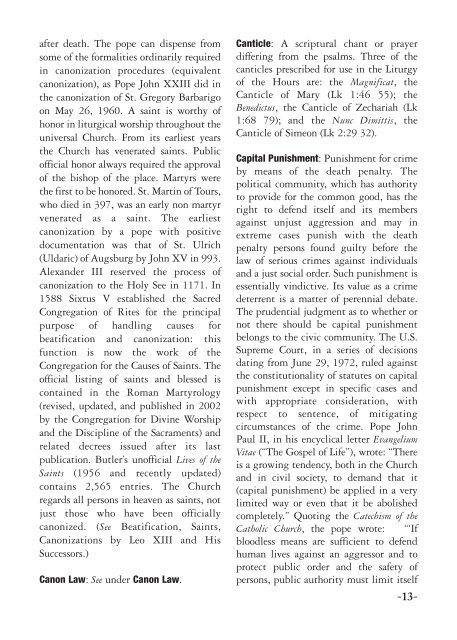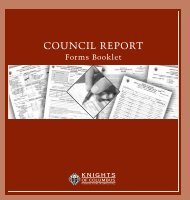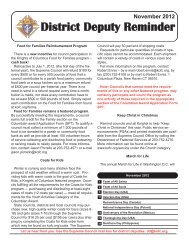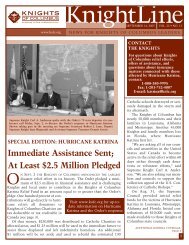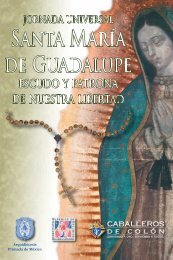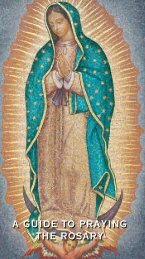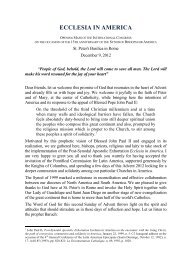CATHOLIC WORD BOOK - Knights of Columbus, Supreme Council
CATHOLIC WORD BOOK - Knights of Columbus, Supreme Council
CATHOLIC WORD BOOK - Knights of Columbus, Supreme Council
You also want an ePaper? Increase the reach of your titles
YUMPU automatically turns print PDFs into web optimized ePapers that Google loves.
after death. The pope can dispense from<br />
some <strong>of</strong> the formalities ordinarily required<br />
in canonization procedures (equivalent<br />
canonization), as Pope John XXIII did in<br />
the canonization <strong>of</strong> St. Gregory Barbarigo<br />
on May 26, 1960. A saint is worthy <strong>of</strong><br />
honor in liturgical worship throughout the<br />
universal Church. From its earliest years<br />
the Church has venerated saints. Public<br />
<strong>of</strong>ficial honor always required the approval<br />
<strong>of</strong> the bishop <strong>of</strong> the place. Martyrs were<br />
the first to be honored. St. Martin <strong>of</strong> Tours,<br />
who died in 397, was an early non martyr<br />
venerated as a saint. The earliest<br />
canonization by a pope with positive<br />
documentation was that <strong>of</strong> St. Ulrich<br />
(Uldaric) <strong>of</strong> Augsburg by John XV in 993.<br />
Alexander III reserved the process <strong>of</strong><br />
canonization to the Holy See in 1171. In<br />
1588 Sixtus V established the Sacred<br />
Congregation <strong>of</strong> Rites for the principal<br />
purpose <strong>of</strong> handling causes for<br />
beatification and canonization: this<br />
function is now the work <strong>of</strong> the<br />
Congregation for the Causes <strong>of</strong> Saints. The<br />
<strong>of</strong>ficial listing <strong>of</strong> saints and blessed is<br />
contained in the Roman Martyrology<br />
(revised, updated, and published in 2002<br />
by the Congregation for Divine Worship<br />
and the Discipline <strong>of</strong> the Sacraments) and<br />
related decrees issued after its last<br />
publication. Butler’s un<strong>of</strong>ficial Lives <strong>of</strong> the<br />
Saints (1956 and recently updated)<br />
contains 2,565 entries. The Church<br />
regards all persons in heaven as saints, not<br />
just those who have been <strong>of</strong>ficially<br />
canonized. (See Beatification, Saints,<br />
Canonizations by Leo XIII and His<br />
Successors.)<br />
Canon Law: See under Canon Law.<br />
Canticle: A scriptural chant or prayer<br />
differing from the psalms. Three <strong>of</strong> the<br />
canticles prescribed for use in the Liturgy<br />
<strong>of</strong> the Hours are: the Magnificat, the<br />
Canticle <strong>of</strong> Mary (Lk 1:46 55); the<br />
Benedictus, the Canticle <strong>of</strong> Zechariah (Lk<br />
1:68 79); and the Nunc Dimittis, the<br />
Canticle <strong>of</strong> Simeon (Lk 2:29 32).<br />
Capital Punishment: Punishment for crime<br />
by means <strong>of</strong> the death penalty. The<br />
political community, which has authority<br />
to provide for the common good, has the<br />
right to defend itself and its members<br />
against unjust aggression and may in<br />
extreme cases punish with the death<br />
penalty persons found guilty before the<br />
law <strong>of</strong> serious crimes against individuals<br />
and a just social order. Such punishment is<br />
essentially vindictive. Its value as a crime<br />
deterrent is a matter <strong>of</strong> perennial debate.<br />
The prudential judgment as to whether or<br />
not there should be capital punishment<br />
belongs to the civic community. The U.S.<br />
<strong>Supreme</strong> Court, in a series <strong>of</strong> decisions<br />
dating from June 29, 1972, ruled against<br />
the constitutionality <strong>of</strong> statutes on capital<br />
punishment except in specific cases and<br />
with appropriate consideration, with<br />
respect to sentence, <strong>of</strong> mitigating<br />
circumstances <strong>of</strong> the crime. Pope John<br />
Paul II, in his encyclical letter Evangelium<br />
Vitae (“The Gospel <strong>of</strong> Life”), wrote: “There<br />
is a growing tendency, both in the Church<br />
and in civil society, to demand that it<br />
(capital punishment) be applied in a very<br />
limited way or even that it be abolished<br />
completely.” Quoting the Catechism <strong>of</strong> the<br />
Catholic Church, the pope wrote: “‘If<br />
bloodless means are sufficient to defend<br />
human lives against an aggressor and to<br />
protect public order and the safety <strong>of</strong><br />
persons, public authority must limit itself<br />
-13-


